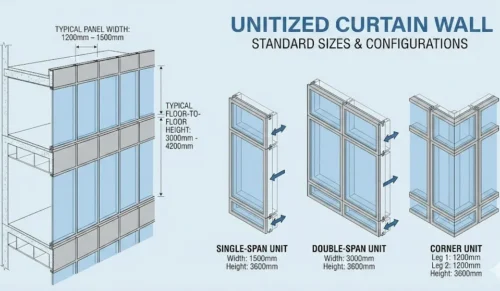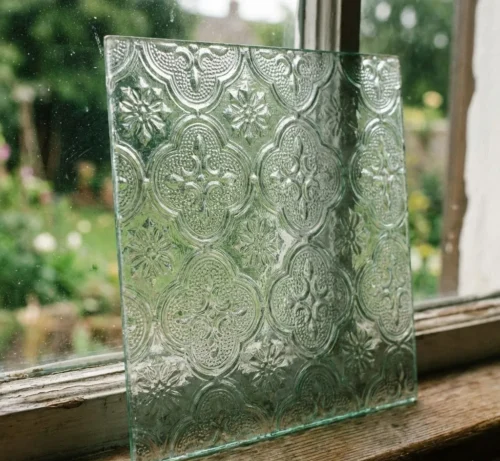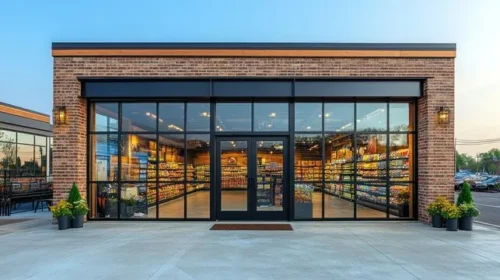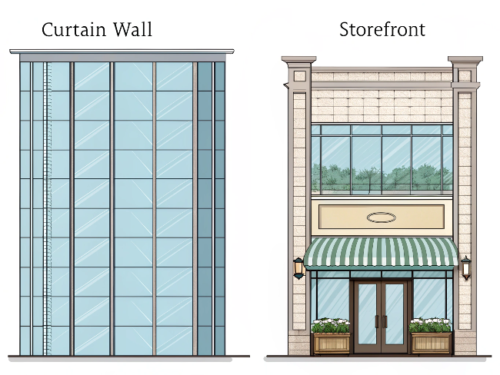Choosing the right door material is about more than design — it’s about performance, durability, and long-term value.
When comparing aluminum doors vs uPVC doors, the debate often comes down to strength, style, and efficiency.
Both materials have distinct advantages that suit different needs — from modern architectural spaces to budget-friendly home renovations.
![school classroom outside door with - Are Aluminum Doors Better Than Upvc? [March 2026] - APRO school classroom outside door with](https://aprowin.com/wp-content/uploads/2024/09/school-classroom-outside-door-with--scaled.webp)
Your doors aren’t just entry points—they’re key to enhancing your home’s design aesthetic, boosting energy efficiency, ensuring security, and standing up to daily wear and tear.
Whether you’re renovating your space or building something new, understanding the differences between these two materials can help you make a well-informed decision.
So, are aluminium doors better than uPVC? Let’s dive into the details to find out which one is right for you!
Material Overview
When choosing between aluminium doors and uPVC doors, understanding their core materials can make all the difference.
Each has unique qualities that cater to different needs and preferences.
1. Aluminium Doors
![school classroom outside door with - Are Aluminum Doors Better Than Upvc? [March 2026] - APRO school classroom outside door with](https://aprowin.com/wp-content/uploads/2024/09/school-classroom-outside-door-with-scaled.webp)
Aluminium is known for being strong, lightweight, and corrosion-resistant.
These characteristics make it a favorite in modern architecture, where sleek designs and larger glass panels are in demand.
The material’s strength allows for slimmer frames, which means you can enjoy more natural light and a minimalist aesthetic without compromising durability.
Aluminium’s versatility makes it a go-to choice for contemporary homes and commercial spaces.
2. uPVC Doors
![front view front doors with green beige wall - Are Aluminum Doors Better Than Upvc? [March 2026] - APRO front view front doors with green beige wall](https://aprowin.com/wp-content/uploads/2024/09/front-view-front-doors-with-green-beige-wall-scaled.webp)
On the other hand, uPVC doors stand out for being affordable, durable, and excellent at thermal insulation.
These qualities make them a practical option for budget-conscious homeowners who want an effective solution for energy efficiency and weather resistance.
uPVC’s low maintenance nature and ability to withstand various climates have made it a staple in residential buildings, especially in regions with extreme weather.
Key Benefits of Aluminium Doors
![gray door with silver handle sign that says no - Are Aluminum Doors Better Than Upvc? [March 2026] - APRO gray door with silver handle sign that says no](https://aprowin.com/wp-content/uploads/2024/09/gray-door-with-silver-handle-sign-that-says-no-scaled.webp)
Aluminium doors are a powerful blend of strength, style, and practicality, making them a popular choice for homeowners and businesses alike.
Let’s dive into what makes these doors stand out.
Durability and Longevity
One of the biggest advantages of aluminium doors is their exceptional durability.
They are naturally resistant to corrosion, rust, and harsh weather conditions, making them ideal for coastal areas or regions with extreme climates.
Plus, they can last for decades with minimal maintenance, giving you a reliable solution that doesn’t require constant upkeep.
Modern Aesthetics
If you’re after a sleek, contemporary look, aluminium doors are the way to go.
Their slim profiles allow for larger glass panels, creating bright, open spaces filled with natural light.
And the best part? Aluminium doors are highly customizable with a wide range of colors and finishes to perfectly match your home’s design style, from glossy to matte to woodgrain textures.
Strength and Security
Aluminium is lightweight yet incredibly strong, making it perfect for supporting larger openings without compromising stability.
This strength also enhances security, as aluminium frames are harder to force open, offering you and your family peace of mind.
Energy Efficiency
Thanks to advancements in technology, modern aluminium doors can be equipped with thermal breaks—special insulating barriers that help reduce heat transfer.
This feature makes aluminium doors highly energy-efficient, helping to maintain comfortable indoor temperatures while lowering your energy bills.
Sustainability
For those concerned about the environment, aluminium is a sustainable choice.
It is fully recyclable, and the recycling process uses just 5% of the energy required to produce new aluminium.
Choosing aluminium doors means you’re not only investing in quality but also contributing to a more eco-friendly future.
Key Benefits of uPVC Doors
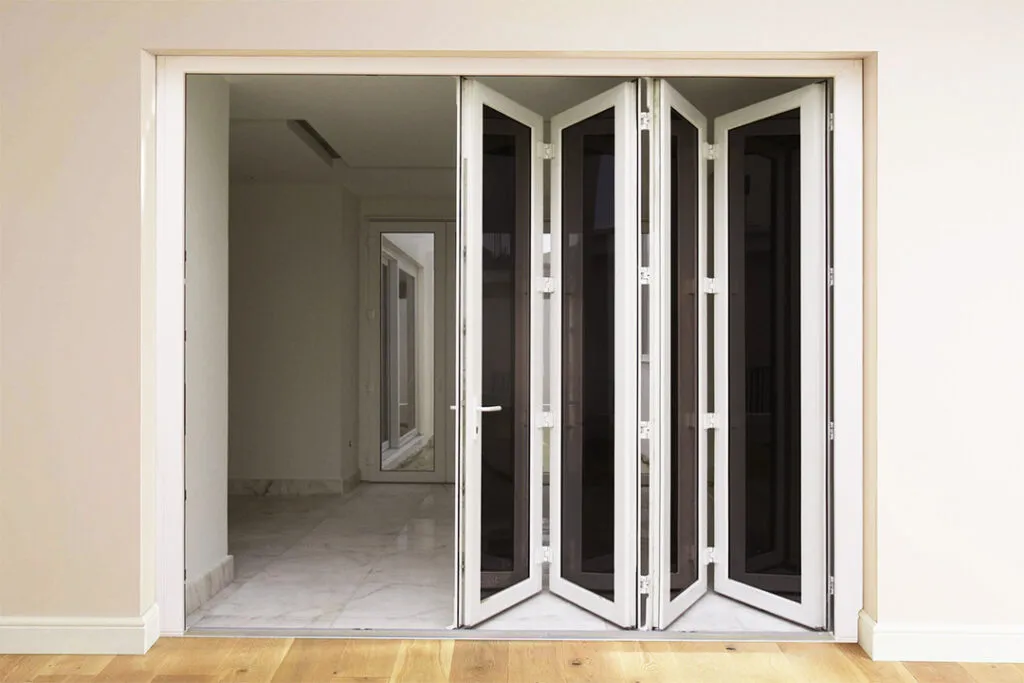
If you’re looking for a practical and budget-friendly solution, uPVC doors are packed with features that make them an excellent choice for homeowners.
Let’s explore the key benefits they offer.
Affordability
uPVC doors are one of the most cost-effective options on the market, making them a great choice for budget-conscious homeowners.
Despite their lower price, they still deliver durability and performance, ensuring you don’t have to compromise on quality to save money.
Thermal Insulation
One of uPVC’s standout features is its natural insulating properties.
These doors help keep your home warm in the winter and cool in the summer, reducing the need for constant heating or cooling.
Over time, this can lead to noticeable savings on your energy bills, especially in areas with extreme climates.
Weather Resistance
uPVC doors are designed to handle the elements.
They’re resistant to rust, rot, and fading, making them a reliable choice for areas prone to rain, wind, or direct sunlight.
No matter the weather, uPVC doors remain sturdy and functional.
Low Maintenance
If you want doors that require little effort to maintain, uPVC is an excellent option.
A simple wipe with soapy water is all it takes to keep them looking fresh—no need for painting, varnishing, or constant repairs.
Soundproofing
Living in a busy urban area or near a noisy road? uPVC doors offer effective sound insulation, helping to reduce noise pollution and create a quieter, more comfortable home environment.
Aluminium vs. uPVC Doors: Comparison Table
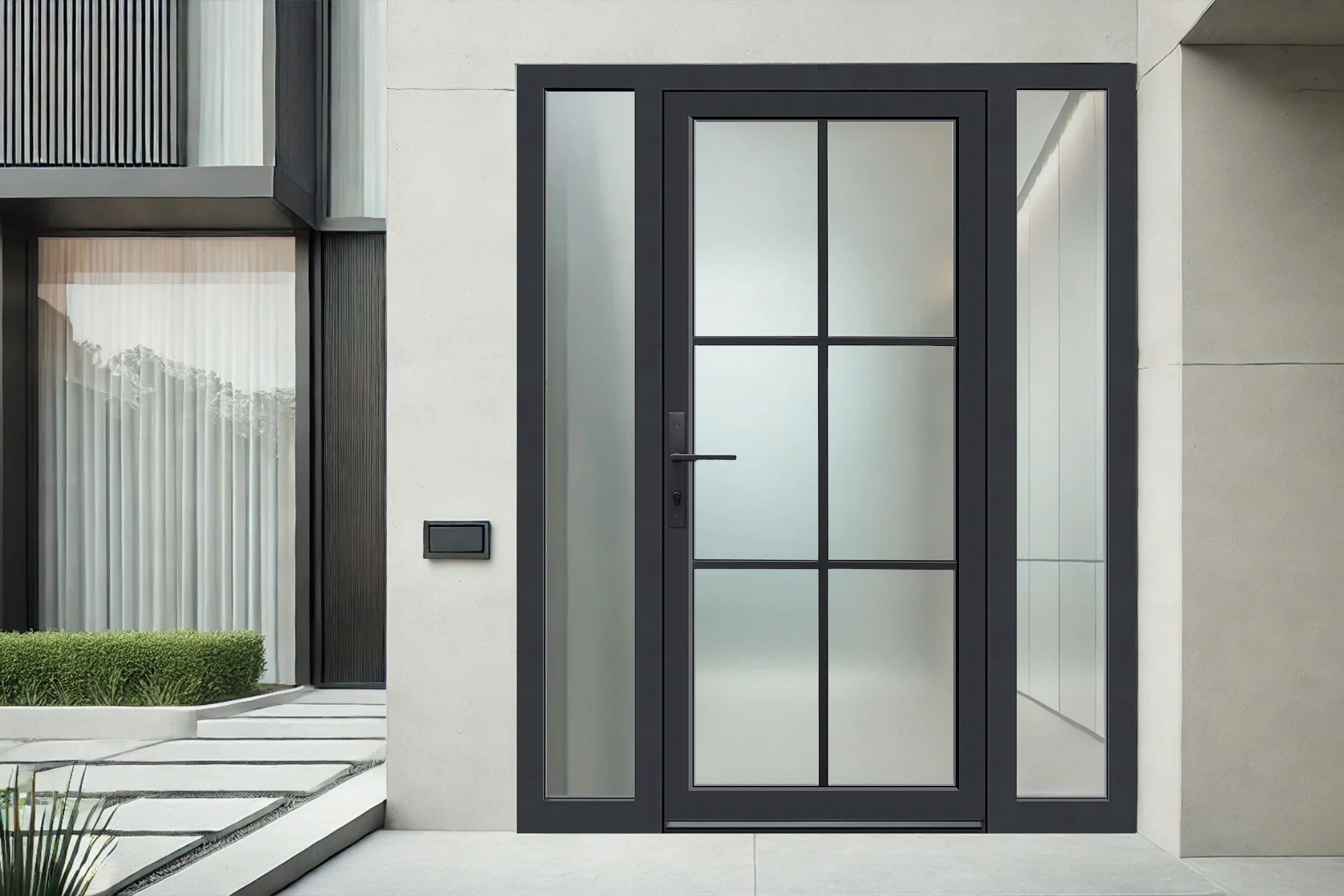
When deciding between aluminium and uPVC doors, it’s essential to compare their performance across key factors like durability, aesthetics, energy efficiency, environmental impact, and cost. Here’s how they stack up:
| Feature | Aluminium Doors | uPVC Doors |
| Durability | Stronger, highly durable, ideal for high-traffic and commercial use. | Durable for residential use but prone to warping over time. |
| Aesthetic Flexibility | Sleek, modern designs with slim frames; customizable in colors/finishes. | Functional but limited in color and style options (mainly white). |
| Energy Efficiency | Requires thermal breaks for insulation but can match uPVC performance. | Naturally insulating; excellent for retaining heat in extreme climates. |
| Environmental Impact | Recyclable and eco-friendly, with a low environmental footprint. | Recyclable but less eco-friendly due to its plastic composition. |
| Cost | Higher upfront cost; better long-term value due to durability. | More affordable upfront; suitable for budget-conscious buyers. |
Use Cases: Choosing the Right Door
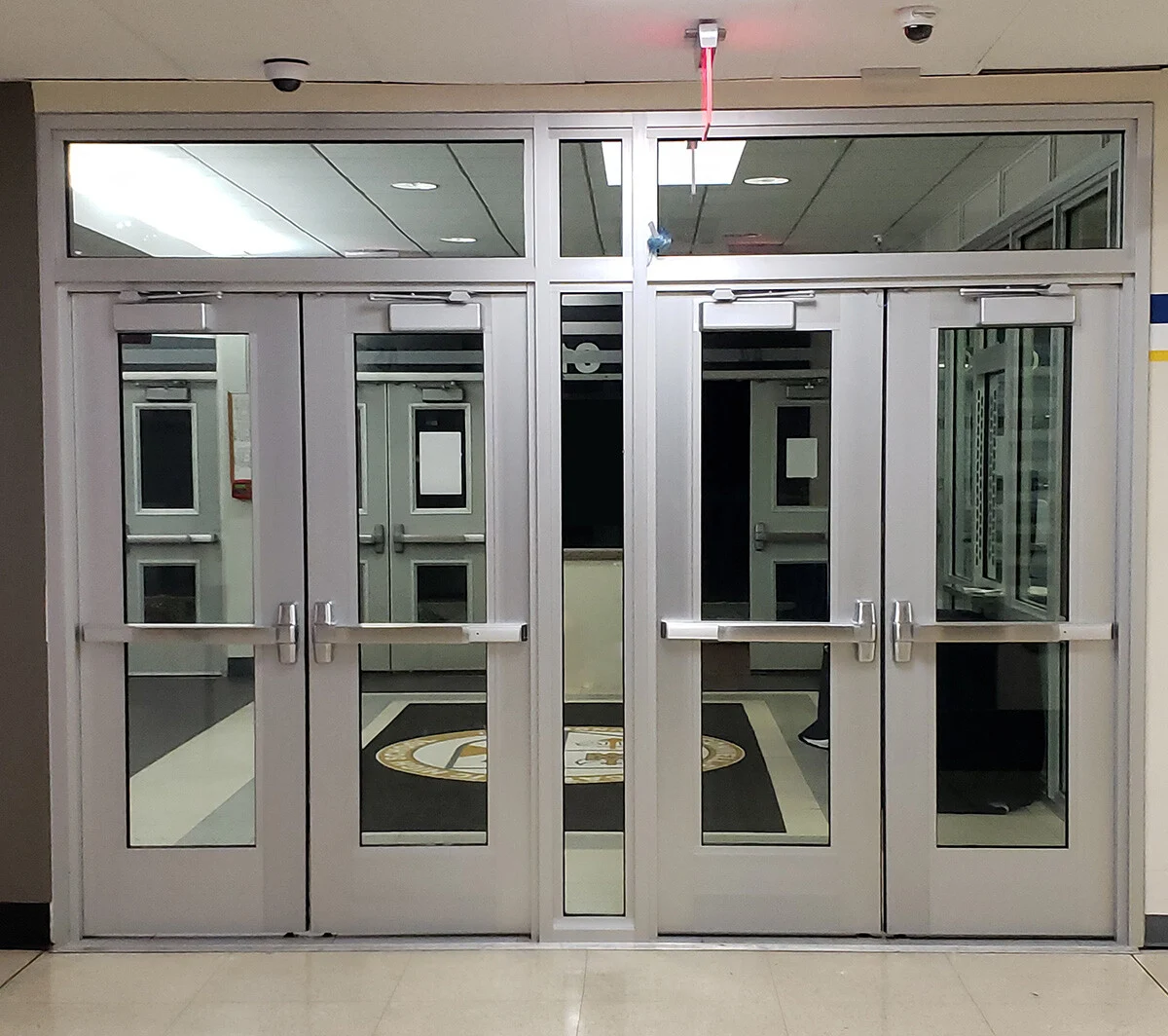
When deciding between aluminium doors and uPVC doors, the right choice often comes down to how and where you plan to use them.
Let’s explore their best use cases to help you decide.
#Residential
uPVC Doors: If you’re looking for a cost-effective and energy-efficient solution for your home, uPVC doors are an excellent option. They’re perfect for modern apartments or budget-conscious homeowners, thanks to their affordability, great thermal insulation, and low maintenance requirements. This makes them ideal for smaller spaces or areas where simplicity and practicality are key.
Aluminium Doors: For modern, luxury, or architectural homes, aluminum doors are the premium choice. Their sleek design and slim frames allow for expansive glass panels, flooding interiors with natural light and creating a truly contemporary aesthetic. If you’re building a stylish or luxury residence, aluminium doors are worth the investment.
#Commercial
Aluminium Doors: In commercial and public buildings, aluminium doors are the clear winner. They offer superior strength, durability, and security, making them ideal for offices, showrooms, and retail entrances. They excel in high-traffic areas, offering unmatched strength, durability, and security.
From retail spaces to office buildings, aluminium doors are designed to handle constant use while maintaining their modern appearance.
#Climate Suitability
Aluminium: If you live in tropical, coastal, or high-humidity regions, aluminium doors perform exceptionally well. With advanced powder coating or anodized finishes, they resist corrosion and humidity, ensuring long-lasting performance even in challenging climates.
With the right protective coatings, they resist corrosion and humidity, making them reliable in challenging climates.
Aluminium doors also withstand monsoon winds and other harsh weather conditions.
uPVC: In regions with extremely cold weather, uPVC doors are the better choice. Their natural insulation properties help keep the cold out and the warmth in, making them energy-efficient for homes in colder climates.
Pros and Cons of Each Material
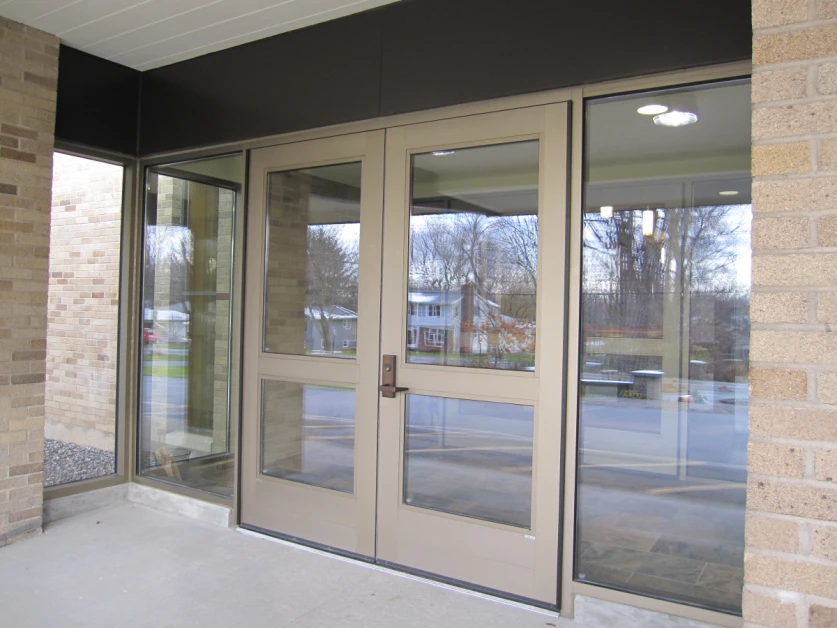
Both aluminium doors and uPVC doors have their strengths and weaknesses, making them suitable for different preferences and needs.
Let’s break them down so you can weigh the options.
Aluminium Doors
Pros:
- Durable: Aluminium doors are built to last, resisting rust, corrosion, and harsh weather conditions.
- Modern Appeal: With sleek profiles and contemporary designs, they enhance the look of any space.
- Customizable: Available in a wide range of colors and finishes, they can be tailored to suit your style.
- Recyclable: Aluminium is an eco-friendly choice, as it is fully recyclable without losing quality.
Cons:
- Higher Upfront Cost: Aluminium doors are more expensive initially, making them a premium choice.
- Requires Thermal Breaks: Without thermal breaks, aluminium doors may lose energy efficiency, especially in extreme climates.
uPVC Doors
Pros:
- Affordable: uPVC doors are cost-effective, making them ideal for homeowners on a budget.
- Excellent Insulation: They naturally retain heat and block cold air, helping to reduce energy bills.
- Low Maintenance: No painting or varnishing is required; a quick wipe is enough to keep them looking clean.
Cons:
- Limited Design Options: While functional, uPVC doors offer fewer color and style choices compared to aluminium.
- Prone to Warping or Discoloration: Over time, especially in extreme heat or direct sunlight, uPVC doors may warp or fade.
FAQs
1. Which material is more durable?
Aluminium is more durable than uPVC, as it resists rust, corrosion, and weathering.
It’s ideal for high-traffic or commercial use, while uPVC is better suited for residential settings with moderate use.
2. Are aluminium doors energy-efficient?
Yes, aluminium doors with thermal breaks are highly energy-efficient, helping reduce heat transfer and energy bills.
Without thermal breaks, aluminium may not insulate as well as uPVC, which has natural insulation properties.
3. Which material is better for coastal areas?
Aluminium doors, with appropriate protective coatings, perform exceptionally well in coastal regions by resisting corrosion and humidity.
uPVC is also weather-resistant but may warp or discolor under prolonged exposure to sunlight and salt air.
4. Are uPVC doors a good choice for noise reduction?
Yes, uPVC doors provide excellent noise insulation, thanks to their natural insulating properties and multi-chamber design.
Aluminium doors can also reduce noise effectively when paired with quality sealing systems and glass.
5. Which material is more cost-effective in the long run?
uPVC doors are more affordable upfront, making them a budget-friendly option for homeowners.
However, aluminium doors offer better long-term value due to their superior durability and minimal maintenance needs.
Conclusion
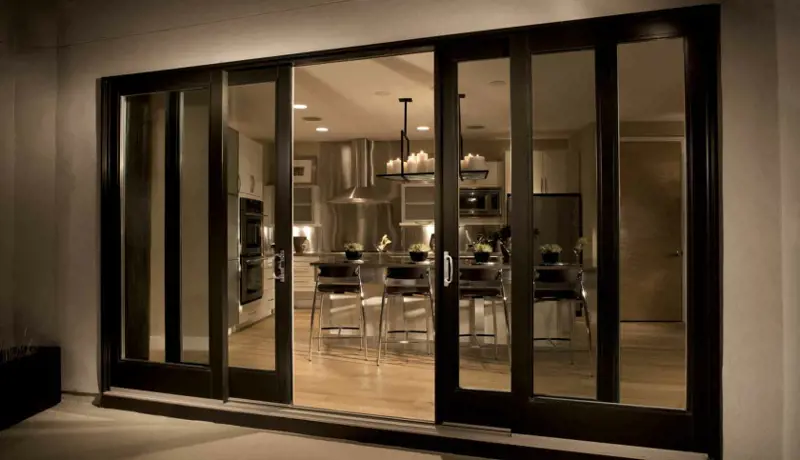
Choosing between aluminium doors and uPVC doors depends on your priorities.
Aluminium offers durability, sleek designs, and long-term value, while uPVC provides affordability, insulation, and low maintenance.
Evaluate your needs, budget, and climate to decide which material is best suited for your home or business.
Ready to upgrade your doors?
Explore our range of high-quality aluminium and uPVC doors, designed to meet your style and performance needs.
Contact us today to find the perfect solution for your space!

![gray door with silver handle sign that says no - Are Aluminum Doors Better Than Upvc? [March 2026] - APRO gray door with silver handle sign that says no](https://aprowin.com/wp-content/uploads/2024/09/gray-door-with-silver-handle-sign-that-says-no-2048x1148.webp)


